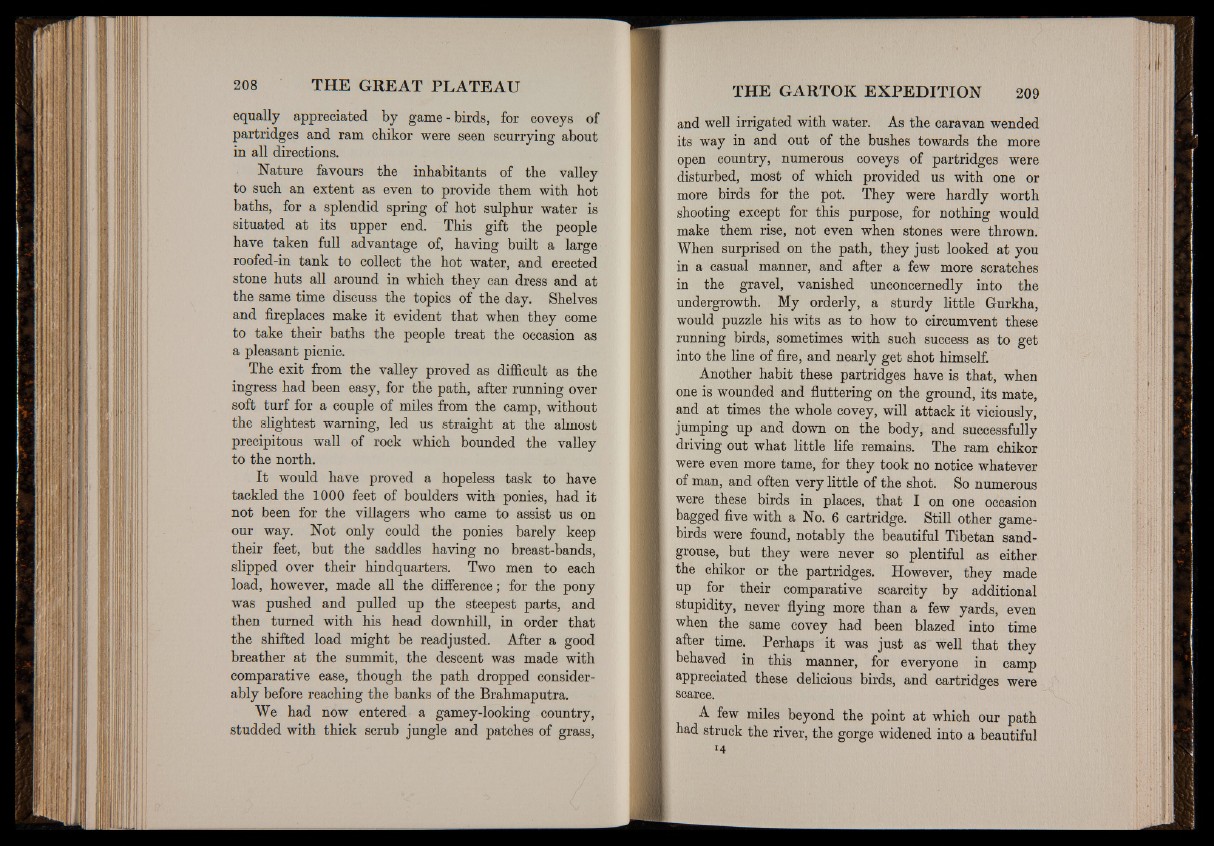
equally appreciated by game - birds, for coveys of
partridges and ram chikor were seen scurrying about
in all directions.
Nature favours the inhabitants of the valley
to such an extent as even to provide them with hot
baths, for a splendid spring of hot sulphur water is
situated at its upper end. This gift the people
have taken full advantage of, having built a large
roofed-in tank to collect the hot water, and erected
stone huts all around in which they can dress and at
the same time discuss the topics of the day. Shelves
and fireplaces make it evident that when they come
to take their baths the people treat the occasion as
a pleasant picnic.
The exit from the valley proved as difficult as the
ingress had been easy, for the path, after running over
soft turf for a couple of miles from the camp, without
the slightest warning, led us straight at the almost
precipitous wall of rock which bounded the valley
to the north.
I t would have proved a hopeless task to have
tackled the 1000 feet of boulders with ponies, had it
not been for the villagers who came to assist us on
our way. Not only could the ponies barely keep
their feet, but the saddles having no breast-bands,
slipped over their hindquarters. Two men to each
load, however, made all the difference; for the pony
was pushed and pulled up the steepest parts, and
then turned with his head downhill, in order that
the shifted load might be readjusted. After a good
breather at the summit, the descent was made with
comparative ease, though the path dropped considerably
before reaching the banks of the Brahmaputra.
We had now entered a gamey-looking country,
studded with thick scrub jungle and patches of grass,
and well irrigated with water. As the caravan wended
its way in and out of the bushes towards the more
open country, numerous coveys of partridges were
disturbed, most of which provided us with one or
more birds for the pot. They were hardly worth
shooting except for this purpose, for nothing would
make them rise, not even when stones were thrown.
When surprised on the path, they just looked at you
in a casual manner, and after a few more scratches
in the gravel, vanished unconcernedly into the
undergrowth. My orderly, a sturdy little Gurkha,
would puzzle his wits as to how to circumvent these
running birds, sometimes with such success as to get
into the line of fire, and nearly get shot himsp.lf
Another habit these partridges have is that, when
one is wounded and fluttering on the ground, its mate,
and at times the whole covey, will attack it viciously,
jumping up and down on the body, and successfully
driving out what little life remains. The ram chikor
were even more tame, for they took no notice whatever
of man, and often very little of the shot. So numerous
were these birds in places, that I on one occasion
bagged five with a No. 6 cartridge. Still other gamebirds
were found, notably the beautiful Tibetan sand-
grouse, but they were never so plentiful as either
the chikor or the partridges. However, they made
up for their comparative scarcity by additional
stupidity, never flying more than a few yards, even
when the same covey had been blazed into time
after time. Perhaps it was just as well that they
behaved in this manner, for everyone in camp
appreciated these delicious birds, and cartridges were
scarce.
A few miles beyond the point at which our path
had struck the river, the gorge widened into a beautiful